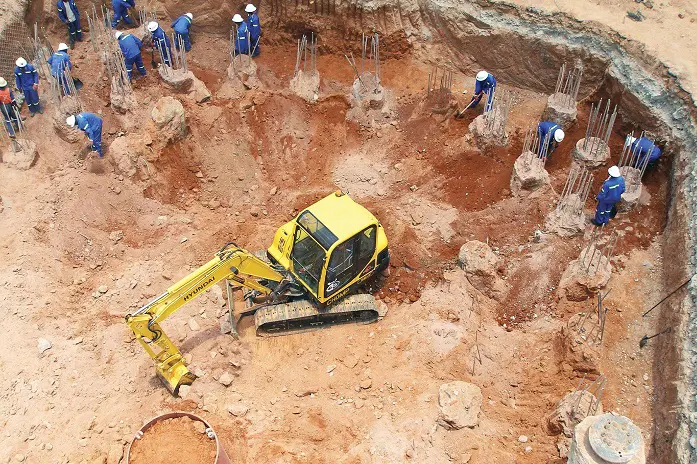A Comprehensive Review of the Key Solutions Used by Consulting Civil Engineering Professionals in Modern Construction
Consulting civil engineering specialists are integral to the success of modern building and construction jobs, providing a multifaceted collection of solutions that address numerous obstacles. From carrying out extensive site analyses and feasibility studies to making certain conformity with strict regulatory structures, these specialists lay the foundation for risk-free and sustainable development. Their competence prolongs to architectural layout and job management, which are vital for achieving cost-efficient and prompt results. As the complexity of construction tasks remains to progress, comprehending the full spectrum of solutions they give comes to be significantly crucial for stakeholders. What implications does this have for the future of construction methods?
Website Assessment and Feasibility Studies
When getting started on any building job, recognizing the website's attributes is crucial, as it straight influences the expediency and layout of the development. Site assessment and expediency studies are important components of the pre-construction phase, enabling stakeholders to make informed choices. These studies entail an extensive assessment of the physical, ecological, and regulative elements of the website.

By incorporating these aspects, civil design professionals can supply an alternative sight of the site's feasibility for the desired development. Eventually, thorough site evaluations and usefulness studies lay the groundwork for successful job implementation, decreasing risks and enhancing resource allotment.
Architectural Design and Analysis
Complying with a thorough website assessment and expediency research study, the following essential stage in the construction process is structural design and analysis. This important service includes the advancement of structural systems that make sure the safety, sturdiness, and financial stability of a project. Consulting civil engineers utilize advanced methodologies and software to evaluate lots, stresses, and material properties, guaranteeing that layouts adhere to pertinent codes and criteria.
Structural layout incorporates different aspects, including beams, columns, structures, and bearing walls. By applying principles of auto mechanics and material science, engineers develop frameworks that can hold up against ecological pressures such as wind, seismic task, and snow loads. The analysis phase entails thorough computations to predict the actions of these frameworks under various problems, ensuring they can perform as planned throughout their lifespan.
Furthermore, speaking with designers work together closely with designers and various other stakeholders to incorporate architectural aspects aesthetically and functionally. The deliverables commonly consist of detailed illustrations, specifications, and extensive records that assist in the construction procedure. Ultimately, efficient architectural style and evaluation are critical in decreasing dangers, enhancing resources, and achieving effective task outcomes in modern building and construction.
Job Management and Sychronisation
Efficient task administration and control are vital elements of effective civil design services, guaranteeing that building tasks are delivered on schedule, within budget plan, and to the required quality requirements. Consulting civil designers play a crucial function in managing numerous project components, from initial planning via to project completion. This includes not only the technological facets of layout and construction however likewise the tactical administration of stakeholders, sources, and timelines.

Furthermore, civil engineering consultants highlight the relevance of paperwork and reporting throughout the task lifecycle - geotechnical engineering in south africa. By maintaining exact documents, they guarantee openness and accountability, which cultivates count on among all events involved. Eventually, skilled project administration and control cause enhanced job end results, straightening with customer assumptions and adding to the overall success of the building undertaking
Regulatory Conformity and Permitting
Effective task monitoring prepares for resolving regulatory compliance and allowing requirements in civil design jobs. Making certain adherence to local, state, and government laws is critical for the effective implementation and completion of any type of building endeavor. Consulting civil engineering professionals play an essential duty in browsing the complex landscape of regulatory structures and permitting processes.
These specialists are well-versed in zoning laws, developing codes, ecological regulations, and safety standards that regulate building and construction techniques. They conduct extensive assessments to recognize all relevant guidelines, guaranteeing that projects comply with essential lawful demands. By working together with governmental agencies and stakeholders, speaking with engineers facilitate the allowing procedure, simplifying authorizations and reducing delays.
Furthermore, they prepare and send the requisite documentation, such as website like it plans, ecological effect analyses, and engineering records. This positive method not just cultivates compliance yet also boosts job feasibility and sustainability. Eventually, effective regulative compliance and permitting are vital parts of a successful civil design task, protecting both the setting and public well-being while contributing to the general honesty and success of construction initiatives.
Lasting Layout Practices
Lasting design practices are progressively identified as important elements in civil design, with an emphasis on reducing environmental effect while optimizing source performance. These practices encompass a variety of techniques focused on promoting environmental equilibrium and lowering the carbon impact of building and construction tasks.
One key aspect of sustainable design is the integration of renewable resource original site sources, such as solar and wind, into building designs. This not only decreases reliance on fossil gas but also improves long-term cost financial savings. In addition, the use of sustainable products, including recycled or quickly eco-friendly sources, plays a considerable function in minimizing waste and saving all-natural sources.
Water monitoring methods, such as rainwater harvesting and efficient irrigation systems, are also crucial in lasting style. These techniques assist in reducing water usage and safeguarding local water environments. Furthermore, environmentally sensitive site planning ensures very little disruption to the all-natural landscape and promotes biodiversity.
Consulting civil design professionals contribute in executing these lasting layout practices. Their experience enables the execution of cutting-edge options that align with both governing demands and customer goals, inevitably adding to a more lasting built setting.
Final Thought
In summary, consulting civil design experts provide essential solutions that underpin the success of contemporary construction tasks. With meticulous website evaluations, cutting-edge structural layout, reliable job management, adherence to regulatory requirements, and the try this implementation of sustainable practices, these specialists add to the development of safe, efficient, and environmentally liable advancements. The integration of these key solutions not just boosts project end results but likewise promotes a sustainable future in the building and construction sector.
Effective task management and sychronisation are crucial elements of effective civil design solutions, guaranteeing that construction jobs are supplied on time, within budget, and to the required quality criteria. Consulting civil designers play a critical role in orchestrating different task components, from initial planning via to predict completion. Inevitably, competent project monitoring and control lead to improved job results, aligning with customer expectations and contributing to the total success of the building and construction endeavor.
